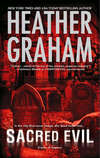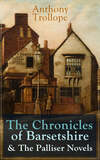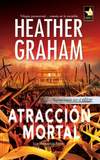Loe raamatut: «Sacred Evil»

Praise for the novels of Heather Graham
“An incredible storyteller.”
—Los Angeles Daily News
“Graham wields a deftly sexy and convincing pen.”
—Publishers Weekly
“A fast-paced and suspenseful read that will give readers chills while keeping them guessing until the end.”
—RT Book Reviews on Ghost Moon
“If you like mixing a bit of the creepy with a dash of sinister and spine-chilling reading with your romance, be sure to read Heather Graham’s latest … Graham does a great job of blending just a bit of paranormal with real, human evil.”
—Miami Herald on Unhallowed Ground
“Eerie and atmospheric, this is not late-night reading for the squeamish or sensitive.”
—RT Book Reviews on Unhallowed Ground
“The paranormal elements are integral to the unrelentingly suspenseful plot, the characters are likable, the romance convincing, and, in the wake of Hurricane Katrina, Graham’s atmospheric depiction of a lost city is especially poignant.”
—Booklist on Ghost Walk
“Graham’s rich, balanced thriller sizzles with equal parts suspense, romance and the paranormal—all of it nail-biting.”
—Publishers Weekly on The Vision
“Heather Graham will keep you in suspense until the very end.”
—Literary Times
“Mystery, sex, paranormal events. What’s not to love?”
—Kirkus on The Death Dealer
Sacred Evil
Heather Graham

For NYC—an amazing place, and for a few of the people who have also made it more amazing by being there.
For Aaron Priest, and all those at the agency: Lucy Childs, Lisa Vance, Nicole James, Arleen Priest, and John Richmond.
And, of course, for my MIRA Books editors in the Big Apple: Adam Wilson, Leslie Wainger,
Margaret Marbury, and Krista Stroever, who went above and beyond and walked the streets of the old Five Points region with me. Thank You!
Yes, ready for my cemetery tour now …!
Prologue
Someone was following her.
Stalking her.
She’d heard the footsteps. Among the deserted streets and the canyons of tall buildings; the sound seemed to echo from everywhere.
The night was extremely dark, and, Ginger Rockford thought, you would have believed that the streets were lit by centuries-old gas lamps, as they’d supposedly been during the filming that day.
A hot afternoon had turned into a chilly, misty night, and a fog was rolling in from the river.
The area seemed ridiculously quiet—except for that sound she heard now and then, a click-click, like a footfall, and then a shuffling noise, as if her stalker dragged a foot.
Great. Chased through the streets by a gimp.
It was New York City, for God’s sake. Millions lived on this tiny island.
So where the hell were they all now?
Ginger turned around to look back in the direction from which she had come. She could still see the row of trailers on Whitehall Street; she had just left one. Sammy Vintner, fat-old-ex-cop studio guard, was still on duty, but she saw that he was on the phone.
He was the only living soul she saw.
There were markers where the tape had been that had held the crowd back during the day, separating the filmmakers from the plebs hoping to catch a glimpse of megastar Bobby Walden.
She cursed Bobby Walden. While she’d waited, believing that he was really going to call her, Bobby had surely been picked up by a big black limousine.
Bobby was a somebody. She was a nobody.
But at least Bobby had spoken to her. The female lead, Sherry Blanco, had almost knocked her over, and she hadn’t even apologized. Well, maybe Sherry would learn. Ginger had done a lot of studying up on actors and their careers. She estimated that Sherry Blanco had about three years left—she was nearly thirty-five, and it was starting to show. Sherry was pretty, but she couldn’t really act. Nor had she been known for any kindness to the young hopefuls with whom she had worked. Ginger hoped with her whole heart that she might be a rising star when Sherry was a burned-out has-been.
At least Angus Avery, the up-and-coming director, had noticed her. Okay, so his words weren’t every girl’s dream. “Perfect! I mean, damn, do you look the role of the immigrant prostitute, her dreams already vanquished!” That was how she had gotten to be the one on Bobby’s arm, and how she had managed to flirt with him.
And then he had said that they needed to hook up, and taken her phone number.
So she had sat in the trailer well past time to leave; Missy Everett and Jane Deaver—who had played the other two young prostitutes in the scene—had begged her to leave with them. Their day of extra-stardom was over. They should celebrate, and wonder if they’d wind up on the cutting-room floor.
She, like a fool, had refused to leave; she’d been waiting for Bobby. And she should have left. The set was a construction site. The ugly old building that had been there had been razed to the foundations and a few structural walls. There were rumors about the site; bad things had happened there. She didn’t really know what—she wasn’t into history. Maybe it had been an old burial ground. But it had been perfect for the set designers when they had installed their prefabricated backdrops and facades, and it had been right next to Blair House, a truly creepy old place. She hadn’t been spooked during the day. The day had been chaotic with actors and crew, one shot being set up while another was being shot, sometimes over and over again if Avery didn’t like the lighting or the camera angle.
How had she managed to be the very last one on set? Oh, yes, waiting and praying that Bobby would really call her.
Sammy had emerged from his guard post. “Hey!” she called back, hoping that he would pay attention, see her and wait for her to come running back. She’d even take a ride with disgusting fat Sammy at this point.
He wasn’t looking her direction. He was going off duty, heading away from her. She should have accepted a ride from him when he’d offered, but she’d been convinced she’d find a taxi right away.
Who the hell knew that the area dried up like a prune once it got late at night?
The guard disappeared behind one of the trailers; he’d been anxious for her to go, of course, once she’d refused to ride with him. She’d been the last one near the trailers, the only one left who had been working on the on-location day-plus shoot for O’Leary’s, a tale about crime and prostitution in the eighteen hundreds in New York City. One of the pubs in the area had had the right interior, and the buildings—except for the gap where the old Darby Building had so recently stood—were perfect. The gutted area and the work tents set up on the old site were shielded by a blue screen for the moviemaking; New York was not a city to make do without the income a permit for such work would secure for the city. Nor, with the preservationist-supporting liberals to be found in the area, could a recently discovered historic site be disturbed.
Even so, the area around the demolished building was surrounded by cheap wire fencing that any schoolboy could scale, and closed by a gate with a two-bit combination lock. It looked like a war zone in a third world country.
She was beyond it, though, and she hurried; the gaping hole in the landscape seemed alive, mocking her for her fear of darkness and shadows.
Now she cursed Bobby Walden. Megastar—jerk!
So, maybe, she had been too easy, too wide-eyed and too hopeful. But he’d really been into her during the shoot; he’d whispered such cool stuff to her between takes that day. She was ready; she knew how to get her name in the paper, and how to move ahead. In film, in the real world, perception was everything. She wasn’t a fool; she didn’t expect a happy-ever-after with Bobby Walden. Just a date—or a night in his hotel room, a place she could pretend to slip out of while being sure that she was spotted by the media. That was all she needed. Her picture on Page Six, maybe. People would start talking about her, and it would make it worthwhile that she’d slept with the pimple-faced assistant at the casting agency to get the job as an extra—a down-and-out historical hooker—for the movie. And, she should still be glad, because she’d wound up with a few lines, enough to quality for her SAG card.
B movie. That was okay. Many a star had gotten his or her start as an extra-suddenly-given-lines. It took something like being singled out by Bobby Walden to get noticed.
“Hey! Hey, Sammy!” she called, walking back toward the site and Sammy. But Sammy didn’t appear from behind the trailer that was just about two blocks away now. He had to have heard her, but even if she ran, she’d never catch him. “Sammy! You fat ass!” she muttered.
Sammy was gone. Probably down in the useless-to-her Whitehall subway station already.
She thought she saw a man; a different man standing by the trailers. He must have been an actor; he seemed to be wearing a stovepipe hat and a long black all-encompassing coat. Whoever it was would be in big trouble with the costume department.
The moon shifted; there was no man standing there. She was making herself bizarrely nervous; it was simply because she’d never imagined that anywhere in New York could become so devoid of people.
She turned and retraced her steps. If she reached Broadway and started running …
She was almost at the corner when she heard the noise again. Click-click-drag.
Was it coming from behind her? Or before her?
She turned the corner and screamed; there was a man standing there. He looked dazed. He was in dirty jeans, a dirtier denim jacket. He hadn’t shaved in days, and his hair was tangled and greasy.
“Hey, lady, you got a dollar? Just a dollar—or some change? Anything—a quarter?” He took a step toward her with his hand outstretched, and she suddenly knew the direction from which the click-click-drag had come. She could smell him; he was absolutely repulsive.
“No!” she cried. “Get away!”
“Lady, I’m just a vet—”
“You’re just an alcoholic or a junkie—and you’re disgusting! Take a bath!” she said. She didn’t even want to touch him to shove him in the chest, but she did so. She was desperate to get past him.
He fell against the wall of the building she was passing. She didn’t look to see what type of office it was; she hurried on for a block, turned around. The ratty old homeless man was gone.
She leaned against a railing where she had stopped, panting, to stare back hard. She wanted to make sure that he was gone—really gone. She needed to get a hold of her fear. As soon as she got a little bit farther up Broadway, she’d start to see people. Ha! Stalked by a derelict who would fall down in a breeze. Well, the louse-ridden bastard was gone now. She kept looking down the street, making sure.
It was amazing; she could hear the traffic on West Street, albeit in the distance. Battery City was no more than a few blocks away. Wall Street was mobbed with cutthroat brokers during the day, and tourists thronged Trinity and St. Paul’s. But now the streets were dead, as dead as those rotting in the old graves and tombs of the city’s churches.
Yes, the derelict was gone, too. She turned to hurry on up Broadway. She hadn’t heard a thing; she hadn’t suspected anyone might be in front of her—she had been looking behind, back to the dark abyss of the site.
Her turn brought her directly into his arms. Before she could open her mouth, his hand clamped over it, and he twisted her viciously around until she was flat against his body.
She tried to scream, but the sound was muffled by the gloved hand. She strained to see, to kick to fight …
She barely even felt the knife across her throat; the blade was that sharp and the slice he made was swift and hard and sure. She was aware that, as the blood began to flow, he dragged her. She saw the lights of the street.
Seeming as pale as old gas lamps. As she died, the world growing dark and cold, she was dimly aware once again that it was all a matter of perception. Blood was rushing from her throat, and she was dying. She was even aware of the irony—that she might become really famous at last.
Somewhere, not far, car horns blared, neon illuminated the city and millions of souls worked, played and slept.
But to Virginia Rockford, the world beyond was no longer of any consequence.
Her last vision was that of a shadow-man. A man in a long black cape wearing a stovepipe hat. A shadow-man, coming at her again with the long wicked blade of his knife.
But she felt no more. Death became a gentle blessing.
1
One great thing about New York City—tourists.
And residents who behaved like tourists, every time he came to the scene of a murder.
Jude Crosby flashed his badge to the officers on duty and ducked beneath the yellow crime scene tape that was stretched across lower Broadway.
The murder site had acquired more onlookers than a movie premiere. Traffic downtown had grown to a snarl that was just about impassable even with the extra traffic cops manning the detour, and the sound of cursing drivers threatened to drown out the sound of their horns.
Fortunately, it was only just dawn; most finance workers weren’t even on their way in yet.
He made his way to the circle of men around the body. He was glad to see that the medical examiner who had been on call was Wally Fullbright, a man in his late fifties with ruffled white hair and big-rimmed glasses; he looked like an aged Beaker, from the Muppets. He was, in Jude’s mind, the finest in his profession. Yet, he never considered his own expertise as the zenith of knowledge, and was known to probe to the depths of any anatomical mystery.
“Crosby!” Fullbright said, acknowledging Jude without looking up. He knew he had a distinctive height, and in his off-hours he practiced at the ring. Pounding away at punching bags helped him release the tension that often bubbled up after dealing with some of the more bizarre crimes that plagued the city.
Even then, he had to make his way through more men; officers had formed a curtain of bodies, hiding the corpse from the view of the crowd that looked on.
He quickly saw why.
“Lord,” he said quietly, hunkering down across the body from Fullbright.
He’d seen a lot as a homicide detective in New York City. Dead drunks, prostitutes, drug addicts, mob hits and victims of domestic abuse. He’d seen the derelicts who had died in Dumpsters, in alleys, atop mountains of trash and he’d seen the floaters who had popped up in the East River and the Hudson.
He’d never seen anything like this.
“Do we know who she is?” he asked.
“Sir!” one of the uniformed men—Smith, according to his badge—said. “She had her ID on her, in her bag. Found next to the body. Her name is Virginia Rockford, twenty-six years old. We believe that she was an actress working on location last night, but that fact still has to be verified. We formed ranks around her as fast as we could when we reached the scene. We called it in to Major Crimes because of … because of the way you see the body.”
“You found her like this?” Jude asked.
The officer blushed and shook his head. “There were people coming around, staring. I threw the coat over her.”
“And I carefully threw it off, again, in favor of the screen of blue,” Fullbright said.
Jude nodded. He understood. The black trench coat now at the victim’s side had apparently belonged to Officer Smith.
He doubted Officer Smith would ever wear the coat again.
Smith shouldn’t have changed the crime scene in any way, but, under the circumstances, Jude knew why he had felt compelled to do so—even if the officer had known better.
He looked at Fullbright. “Tell me, please, that she wasn’t—gutted—alive?”
Fullbright shook his head, indicating the thick pool of blood at the victim’s throat, and the way it had poured down the front of her dress. “It’s my belief that she was seized, her mouth muffled, though God knows who might have heard her scream down here at night, and that her throat was slit ear to ear immediately. I think, and it’s my theory, but, logical, if you will forgive me, that she was nabbed on the corner, and quickly dragged into the street as she died. There are two slashes, but I believe the first would have caused her to bleed out. The mutilation of the body occurred after death.”
“I’ve seen some bad ones in my day, but this seems exceptionally sick, don’t you think, Detective Crosby?” one of the other uniformed men asked.
“They come in very, very, very sick sometimes,” Jude said quietly.
He looked at the victim again, feeling his own stomach curdling. There was bruising on her face, which might have come from a blow, or from the force the killer used to hold her while slashing her throat. Her legs were bent at the knees slightly, and falling outward in a sexually implicit line. Her stomach appeared to have been sliced deeply several times, but there was now such a mass of congealed blood and ragged flesh, there was little he could tell about any precise injury that had been done to her.
“How long has she been here?” he asked Fullbright.
“I’m estimating time of death to be around eleven,” the medical examiner told him. “Give or take an hour.”
Smith offered, “I was on duty down here, Detective Crosby. I had just come on duty. I came running when I heard a woman screaming.” He pulled out a pad and read from his notes, nodding toward a woman who was on the sidewalk, surrounded by officers. “She’s Miss Dorothy Hannigan, and she runs the bakery on the corner. She came walking from the subway exit—” he pointed down the street “—and started screaming when she saw the body. I called in dispatch for help and they called you.” He swallowed hard. “It was barely light … I thought she was a mannequin, a movie prop, at first.”
Jude Crosby studied the body a moment longer; he wasn’t sure it was necessary. The details seemed to be etched into his mind.
He was sure that Fullbright was right—she had been nabbed while walking on the sidewalk, and dragged out to the road to die. He wondered how long, even with the light traffic at night, it had taken the bakery worker to discover the body. Time of death wasn’t exact, and a number of cars had to have driven by at sometime.
He started to rise.
“The Ripper,” Fullbright said.
“Pardon?” Jude looked over at the man he sincerely respected.
Fullbright looked at him and spoke dryly. “Jack the Ripper. London murderer of the late eighteen hundreds. Come on, Jude, you were sent to study criminal history and crime-fighting methods across the pond. The Ripper. Jack the Ripper. His first victim—well, the first victim agreed upon by most criminal experts and Ripperologists—was Polly Nichols. Found on August 31, 1888. She was found … just as we’ve found this girl.”
Officer Smith made a sound at the back of his throat. “That was well over a hundred years ago, Doctor. I doubt the same man could have killed this girl. And, hell, that was London, not New York.”
“One theory regarding the cessation of the murders after the Mary Kelly grand finale was that the bastard came to the United States,” Fullbright said, looking at Jude.
Jude asked Fullbright, “You think we might have a whacked-out murderer who is also a Ripperologist—one dedicated to the point of re-creating the crimes himself?”
“I hope not,” Fullbright said. “They just got worse,” he added softly. “The murders just became more and more vicious. Until Mary Kelly, and then …”
And then …
Of course, no one knew what would happen next. Jude was far from a Ripperologist, but he’d attended a lecture at a British forum on “Historical Crimes, Modern-day Solutions: Crimes That Would Have Been Solved in the Twenty-first Century.” He knew that theories abounded. One was indeed the idea that the Ripper had come to the United States. But, of course, wherever he had gone—to America, Africa, South America—or hell itself—that had been over a hundred years ago. And Jude didn’t believe that he was a Freddy Krueger-type monster who had returned to roam the streets.
And still, he felt a deep unease sweeping over him. Last week, they’d found the remains of a girl in the Hudson; she was still a Jane Doe, but her throat had been slashed. A pleasure boater had reported the remains; police divers had brought her in. Two weeks before, there had been a victim who had died en route to the hospital without ever being able to speak or point a finger even vaguely in the direction of her attacker; she’d been cut—slashed and stabbed.
But not like this.
Not like this poor girl.
Probably a once pretty girl, who had been alive just last night. Filled with hopes and dreams. She might have been nice; she might have been a scrapper, one of the thousands of hopefuls who came to the big city each year to strike it rich in the Big Apple. The open chart of her life was closed, and it didn’t matter if she’d helped old ladies cross the street or snubbed the geeks who had stared at her when she had walked by, oblivious. No one deserved this kind of end.
He noted the position of her body, and that she had certainly been positioned and displayed; he was sure the killer had worn gloves, and been careful not to let his victim catch any skin cells in her fingernails. Still, there was always hope.
Jude stood up and started going through the initial motions. He ordered that his victim’s hands be bagged in hopes she’d gotten her nails into the bastard that had killed her somehow or somewhere, but he knew he didn’t even have to say the words. Fullbright was on the case.
Photographs were taken of the body. He watched that procedure, making certain that the techs took every angle he might need.
He spoke to the uniformed officers on the street. Buildings were to be canvassed in hopes that someone had been somewhere doing something. The crime scene unit was called in to search the area for any possible minuscule clues.
Fullbright stood, giving additional orders to the officers and his assistant. He looked at Jude while the gurney and body bag were brought over, everyone there moving quickly and efficiently.
“You’re working alone on this?” Fullbright asked him.
“I don’t have a new partner yet. I haven’t had anyone assigned to me since … since Monty took a bullet,” Jude told him.
“How’s he doing?”
“He’s having another surgery on Friday. They’re hoping he’ll walk again,” Jude said.
He tried to keep his voice even, and free from the resentment he couldn’t help but feel. Niles Monty had been doing the right thing—he had been the perfect officer, trying to talk down the drugged-out vet who had just shot and killed his wife. His partner had been doing all the right things, and the soldier, in tears, was ready to hand his weapon over to Monty. Instead, a frightened vigilante neighbor who’d snuck up the fire escape had taken a shot and missed; the frightened vet had fired at Monty, before turning the gun on himself.
Jude had been waiting quietly next to Monty who had been doing a damn good job talking the man down. He felt the bullet whistle by, but too late to stop the lethal action that had all taken place in less than ten seconds. He’d managed to stanch the flow of blood emitting from his partner while praying for the medics to hurry.
The vigilante was walking the streets, his case having been dismissed, portraying himself to the press as a hero. How he was managing that, since his actions had caused the crippling of a veteran cop with twenty years’ experience and a slew of medals, Jude didn’t know.
God, he hated the press.
And the press was going to have a field day with this.
He looked through the crowd of television vans and camera crews setting up near the scene. He noticed Melissa Banks, who tended to be a responsible newspaper journalist in a world where sensationalism had become everything.
He strode straight for her. “Ms. Banks,” he said, acknowledging her. “We have found the body of a woman on Broadway, and look, I suppose that’s evident, but it’s all I can give you at the moment. Headquarters will make a statement later. Pending notification of next of kin, I can’t release her name.”
“They’re saying that her throat was slashed and that she was—ripped to shreds. Do we have our own Jack the Ripper in the city now, Detective Crosby? A Jack the Slasher, as it were?” Melissa asked him. He winced. His killer had a name now.
“We don’t know if this was an isolated incident or not, Ms. Banks. As soon as we have information, we will certainly bring it to you in the best interest of the public. Now, if you’ll excuse me …?”
The officers who had been first on the scene had done their best to keep the details hidden, but it was New York. People had seen. They’d seen beyond the crime scene tape and the wall of bodies, and they had seen the amount of blood around the victim. People were going to talk; speculation would run high, and if his killer was a sensationalist trying to prove a point, he would be savoring the attention he was getting this very minute. He would be somewhere, watching, and gloating over his victory.
“Should women in this vicinity be worried to walk about at night?” Melissa Banks asked him.
He stared at her; she tended to be an intelligent woman. “Women should always be careful walking about at night. However, since the financial district is relatively quiet at night, yes, I would definitely take extra care.”
One of the other reporters had heard his words and moved in. “Did you just say that it’s not safe to walk the streets at night?”
Jude stepped toward her. “What I just said was that any single woman should take care at any time—anywhere. Sadly, there is evil in this world, and there are those who will hurt others. I’m suggesting women not be alone late at night on quiet streets. Period. I’m also suggesting that journalists be responsible and not create panic where panic will avail no one. I’m promoting common sense, and if you’ll really excuse me now, I have work to do.”
Jude walked back to the body, and looked at the corner. He paused, and motioned to a crime scene tech, who hurried over. “Blood, I’m pretty sure,” Jude told him, and the fellow nodded gravely and went to work. On the sidewalk, he found more drops of blood, and motioned as well.
A photographer followed the techs, taking pictures as they took samples of the substances on the ground.
He was certain that Fullbright had been right; his victim had been walking uptown, as if she was trying to find a busier spot on Broadway, perhaps to hail a cab. The assailant had waited for her on the corner behind the building. Jude didn’t like his audience, though the uniforms were doing the best they could to control the scene. He was still downtown on a busy Monday morning, and blocking off an entire street in the vicinity of the stock market, city hall, Trinity, St. Paul’s and the Woolworth Building was not easy. Still, he called one of the young officers over, took a position behind the first building and had the officer walk toward him.
He couldn’t be seen until the last minute. When he stepped out, it was easy to accost the man, spin him around and ascertain that a strong man could have certainly caught a woman so; he would have had to have dragged her as she bled, and thus the trail to the street.
Why leave her in the street?
So she would be found, and found as she was.
He scanned the crowd, wondering if any of the men hovering about in their business suits, construction vests, chef’s outfits, messenger tees or other attire might be a killer. He wouldn’t be bloody anymore; he’d be fitting in with the crowd.
Jude walked down the sidewalk to where the bakery manager still stood, trembling with two officers. She was shaking badly.
Dorothy Hannigan was a woman with a thin face and thinner body; she obviously did not indulge frequently in her bakery’s items. She looked at him with wide brown eyes and an expression that still denoted the horror of her discovery.
“Ms. Hannigan, I’m Detective Jude Crosby. I know you’ve already given the officers your statement, so I really just want to thank you for so quickly summoning help, and for all that you’ve done to assist us in the investigation.” She hadn’t really done anything—she’d screamed instinctively. But he had discovered that the right tone of questioning always produced more than dismissal or rudeness.
She nodded, seeming to get a bit of a grip. “Shall we have some coffee?” he asked her.
She looked nervously at the corner bakery. “I open. I gave the keys to one of the boys … but I guess no one is really going to be hungry around here for a while.”
He smiled. “They’ll be hungry,” he said. Don’t kid yourself, he thought. People will be converging to talk. When the crime scene tape is gone, they’ll be fighting each other to get in the street and photograph the position where the body lay.
“But come in … the police will clear this with your boss.” He nodded to Smith, who hurried on in ahead of him. He ushered Dorothy Hannigan to a booth at the rear of the bakery. Apparently, the boy she had given the keys to had gotten things going; customers were already in the shop, but other than Dorothy Hannigan’s white face, little gave away the fact that Jude was anything other than an ordinary customer. His suit was a good one, not that a homicide detective in New York made the big bucks, but he had a great apartment in Hell’s Kitchen, thanks to his father’s savvy with real estate, and it seemed, lately, that he lived to work. That meant decent suits—and suits that blended in well with the business attire in the moneyed district where he worked.
Tasuta katkend on lõppenud.




















